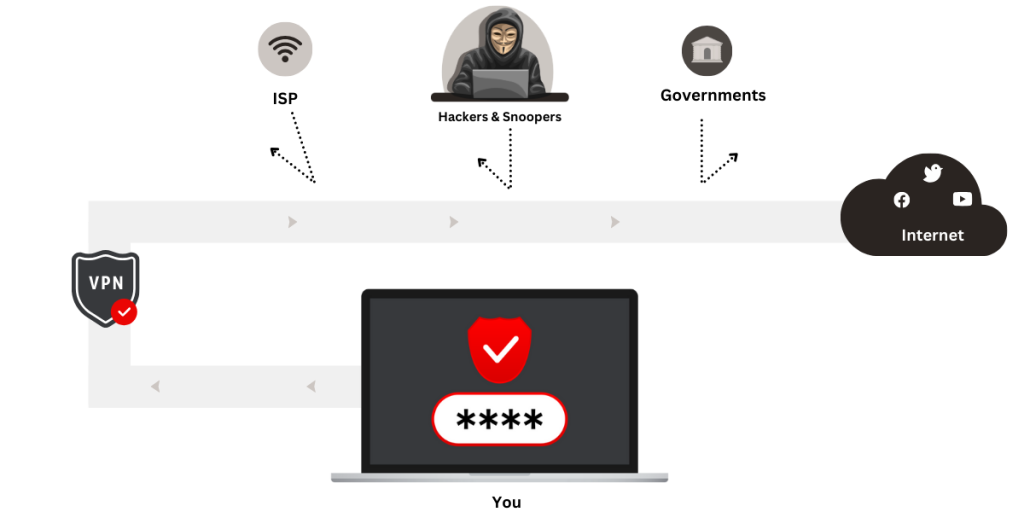What is a VPN, and why do we use it?
Last updated: October 24, 2023Table Of Contents
A VPN, or virtual private network, is a network that creates a secure connection between your device and a remote server. This connection encrypts your traffic, making it difficult for third parties to intercept your data or track your online activity.
Why do we use a VPN?
We use a VPN to protect our privacy and security online. It encrypts our traffic and hides our IP address, making it difficult for third parties to track our activity or intercept our data. This is especially important when using public Wi-Fi networks, which often need more security.
VPNs can also bypass geo-restrictions and access websites and services blocked in our region. For example, travelling to a country with strict internet censorship, we can use a VPN to access our favorite websites and social media platforms. In addition to these benefits, VPNs can also be used to:
- Protect our devices from malware and phishing attacks.
- Prevent our ISP from throttling our internet speed.
- Access region-locked content on streaming services.
Overall, VPNs are a valuable tool for protecting our privacy and security online. They can also improve our performance and access content that would otherwise be unavailable.
How does a VPN Work?
A VPN, or virtual private network, works by creating a secure tunnel between your device and a remote server. This tunnel encrypts your traffic, making it difficult for third parties to intercept your data or track your online activity.

When you connect to a VPN, all of your traffic is routed through the VPN server. This means the VPN server is an intermediary between your device and the internet. The VPN server encrypts your traffic before it is sent to the internet. This encryption makes it impossible for anyone to intercept and read your data.
The VPN server then decrypts your traffic once it is received from the internet. This usually allows you to access the internet but with the added security of the VPN tunnel. This process happens in the background, so you don’t need to do anything special to use a VPN.
Which is one of the best VPNs?
There are many different VPN providers available, both free and paid. It can be challenging to choose the best VPN for your needs, but there are a few things to keep in mind:
- It should use strong encryption and security protocols to protect your data.
- It should offer fast speeds so that you can stream video, play games, and browse the web without any lag.
- It should have a good privacy policy and not log your online activity.
- VPN providers offer a variety of pricing plans, so choosing one that fits your budget is important.
Here are some of the best VPN providers in 2023:
- XNXUBD VPN: XNXUBD VPN is an app that combines a web browser with a built-in VPN service. It has more than 100+ servers across 60 countries worldwide. It’s free to download and available for Android, Windows and iOS.
- ExpressVPN: ExpressVPN is a popular choice for VPN users. It offers fast speeds, an extensive server network, and robust security features.
- NordVPN: NordVPN is another popular choice for VPN users. It offers many features, including a built-in ad blocker and malware protection.
- Surfshark: Surfshark is an excellent option for budget-minded VPN users. It offers an extensive server network, robust security features, and unlimited connections.
- Private Internet Access (PIA): PIA is a good all-around VPN provider. It offers a large server network, strong security features, and a reasonable price.
- ProtonVPN: ProtonVPN is a good choice for users concerned about their privacy. It offers strong security features and a good privacy policy.
It is important to note that there is no one-size-fits-all answer to the question of the best VPN. The best VPN for you will depend on your individual needs and preferences.